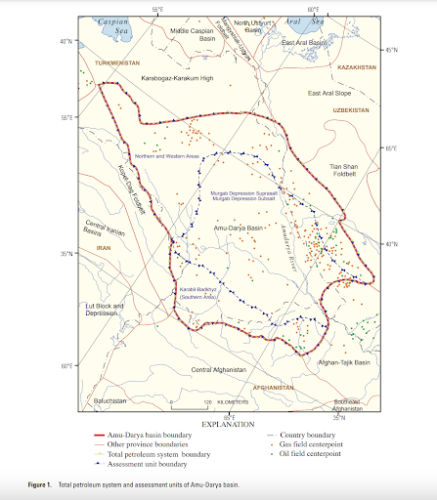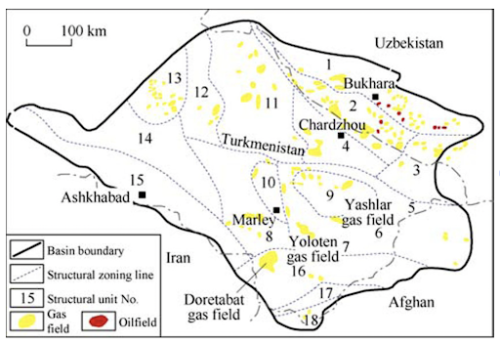Afghanistan inks an oil deal with China, but the Taliban and Beijing don’t really trust each other
The Taliban-led administration has signed a contract with a Chinese company to extract oil from the Amu Darya basin in northern Afghanistan. But recent attacks on Chinese nationals and other marks of instability will likely make Beijing proceed cautiously.

The Taliban-led administration announced a deal with China’s Xinjiang Central Asia Petroleum and Gas Co (CAPEIC) on Thursday to extract oil from the Amu Darya basin located in the northern part of Afghanistan.
The contract marks the first major agreement between the Taliban and a foreign company since the group took control of Afghanistan in August 2021, building off Beijing’s earlier announcement in April to resume the project “in due course.”
- “The company (CPEIC) will invest $150 million in one year and $540 million in the next three years. In this contract, the [Taliban administration] will be a 20% partner, and this share will increase to 75%,” Zabihullah Mujahid, spokesperson for the Taliban-run administration, said on Twitter. “About 3,000 Afghans will be employed in this project,” he added.
- “The Amu Darya oil contract is an important project between China and Afghanistan,” China’s ambassador to the country, Wáng Yú 王愚, said at a news conference.
- The new contract states that the oil will be processed in Afghanistan. It also allows for the deal to be terminated automatically if CAPEIC fails to meet its material obligations within a year.
A similar deal was signed back in December 2011, when the former U.S.-backed Afghanistan government approved a deal to allow China National Petroleum Corporation (CNPC) to develop oil blocks in the Amu Darya basin.
- CAPEIC was founded in June 2000, and was restructured from the Xinjiang branch of PetroChina, a subsidiary of CNPC.
- In 2010, the company also signed a contract for a power generation and supply project for the part of the Amu Darya river located in Turkmenistan.
- Another Chinese state-owned company is in talks with the Taliban-led administration over mining operations at the Mes Aynak copper deposit near Kabul, following a $3 billion, 30-year agreement signed under the previous government in 2008.

The Amu Darya is a major river in Central Asia that acts as a transboundary shared by Afghanistan, Kyrgyzstan, Tajikistan, Turkmenistan, and Uzbekistan. The surrounding area is home to the largest gas-bearing basin in Central Asia, and the world’s third-largest gas-rich basin after the western Siberian Basin and the Persian Gulf Basin, according to a study led by PetroChina.
- However, the highly productive single petroleum system is rich in gas, but relatively low in oil reserves, according to a 2004 U.S. geological survey.

“At the time, the reason CNPC went into [the initial deal] was not so much for the oil, which is quite limited, but because of the project’s gas reserves that their engineers who were working on the same field across the border in Turkmenistan thought would be there,” Raffaello Pantucci, senior fellow at S. Rajaratnam School of International Studies, told The China Project today. “The company figured that this would give them a foothold for when the gas contract eventually came up for tender. I suspect the logic from the Chinese side is not dissimilar now.”
- “From the Afghan side, the Taliban are desperate for investment and big projects,” he added.
China’s engagement has been a lifeline to the Taliban, which has found itself in a vulnerable and unstable position since rising to power. Though the Taliban’s regime has not been recognized by any country internationally, including China, Beijing has vested interests in the country and has displayed rare support for the insurgent leaders through provisions of humanitarian aid.
- Under the Belt and Road Initiative, China has continued to increase its investment, trade, and business activities in Afghanistan since the Taliban rose to power in August 2021.
- Chinese companies are expanding their plans in the country, after the Taliban approved the first Sino-Afghan joint project to develop a $216 million industrial park on the outskirts of Kabul last April.
- The park will include things like construction, the production of building materials, and mining operations — an area of particular interest to Chinese businesses because of Afghanistan’s massive deposits of copper and lithium.
“Up to now, most of the projects and money that has come in — aside from aid, of which there has been some — has been private enterprise or individual Chinese entrepreneurs. The Chinese state has actually committed very little, though they did support the restarting of the Pine Nut Air Express,” Pantucci told The China Project.
- “China supports its enterprises in investing and starting businesses in Afghanistan when the security situation permits,” according to the official readout of the Tunxi Initiative held in March 2022.
China news, weekly.
Sign up for The China Project’s weekly newsletter, our free roundup of the most important China stories.
But Beijing’s desire to expand economic engagement in the war-torn country has been marred by a recent string of attacks targeting Chinese nationals in the region — most recently by Islamic State militants at a hotel frequented by Chinese businessmen in Kabul.
- China’s Foreign Ministry advised its citizens in Afghanistan to leave the country “as soon as possible” following the attack.
- The Taliban announced today that it killed eight Islamic State militants and arrested nine others during a series of raids targeting key figures in a spate of attacks in Kabul, including those involved in the hotel incident.
“I have a sense we are not going to see a wave of effort quite yet, but possibly a few more projects gingerly moving forward,” Pantucci told The China Project. “China is wary of committing too much, as it fears that it will then become responsible for whatever chaos ensues in Afghanistan, and it does not find the Taliban a particularly reliable partner.”
“Though, nor are the Taliban that trusting of the Chinese,” he added.






